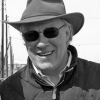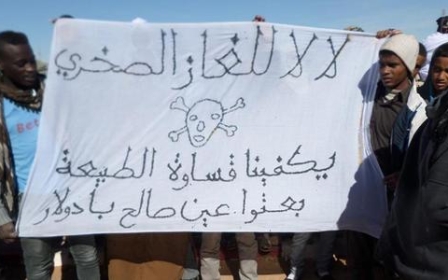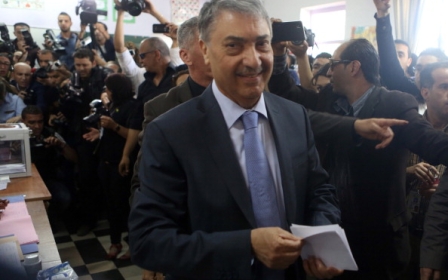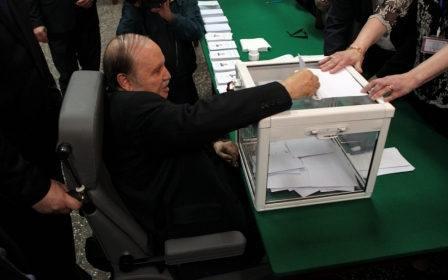A new political party for Algeria and the Bouteflika family
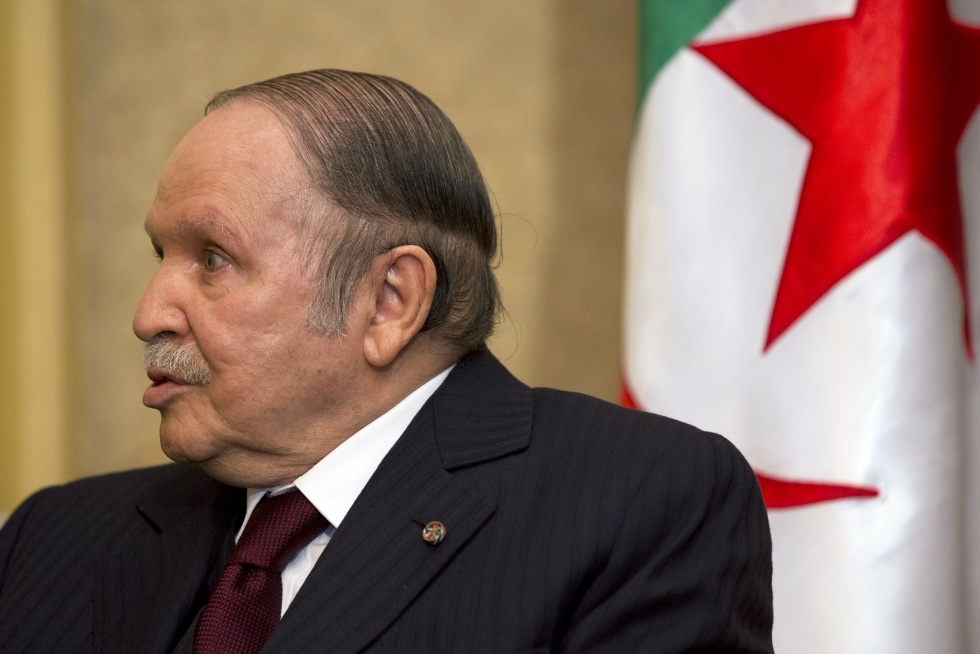
Rumours that Ali Haddad, 50, Algeria’s richest businessman and close confidant of President Abdelaziz Bouteflika, 78, and his family, may run for high political office took more shape on 22 March when Algeria’s El Watan newspaper said that Haddad was on the verge of founding a new political party rumoured to be called El Kakhr (Pride).
El Watan claimed Haddad’s political venture not only had the backing of several present and former ministers and prominent political personalities, but the financial backing of businessmen who had followed Haddad’s lead in financing Bouteflika’s 2014 reelection campaign.
Neither political parties nor elections are quite the same in Algeria as they are in the West. Elections are massively rigged to provide the outcome that Algeria’s authoritarian regime requires. While registered opposition parties serve to give a semblance of democracy, the government parties, namely the National Liberation Front (FLN) and National Rally for Democracy (RND) serve primarily to control the legislatures and facilitate regional governance and administration.
Crisis of succession and oil price slump
Why then, is the creation of a new party so important? The answer is all about timing. Algeria is currently facing two unprecedented crises. One is that Algeria’s hydrocarbons revenues, which make up over 95 percent of export earnings, are down some 50 percent as a result of the fall in world oil prices. Radical economic measures are required.
The other is that the country is experiencing a power vacuum. Bouteflika, in power since 1999, has not only hit an all-time low in the popularity stakes, but has been incapable of fulfilling the functions of the presidency since a stroke in April 2013.
Since then, the question of who is running the country is asked almost daily. The answer is that the presidency, operating furtively behind closed doors, is largely in the hands of the president’s even more unpopular younger brother, Said Bouteflika, and an entourage that includes General Gaid Salah, 75, deputy defence minister and chief of the general staff, but described by US ambassador Ford in a Wikileaks cable (19.12.2007, ID. 135031) as “the most corrupt official in the military apparatus”, and General Athman “Bachir” Tartag, formerly deputy to General Mohamed “Toufik” Mediene, director of the country’s intelligence service the DRS, but dismissed under a cloud last year. The entourage also includes multi-billionaire businessman Haddad, arguably now the most powerful man in Algeria.
Moreover, with indications that the president may finally be nearing his end, infighting within the regime over his succession appears to be intensifying. Names of possible successors - Mouloud Hamrouche, Ali Benflis, Ahmed Ouyahia, Abdelmalek Sellal, Tayeb Belaiz, Gaid Salah, Said Bouteflika - have long been in the media mix.
Since at least 2009, it has been no secret that Said Bouteflika would like to succeed his brother. However, few analysts have ever taken Said Bouteflika’s presidential aspirations seriously. He is deemed unelectable, being hated by both the army, especially the DRS “old guard” that remains loyal to Mediene, and the public, who see him as the spider at the centre of the Bouteflika family’s web of corruption that has turned Algeria into what many regard as a “mafia state”. Moreover, Said’s ambitions towards the presidency, whether for himself or a member of his entourage, are motivated more by the need to secure immunity from prosecution for himself and the Bouteflika clan, than any desire to improve the lot of the Algerian people.
In the last few months, the Algiers rumour mill has again being linking Said’s name to the succession issue, but increasingly in some sort of arrangement with Haddad.
Haddad's business empire
Trained as a civil engineer in the 1980s, Haddad formed his own road-building company in 1988. By the early 2000s, he had used his contacts with Bouteflika’s inner circle, notably ministers Amar Ghoul (public works), Abdelmalek Sellal (water resources) and Said Bouteflika to win numerous major government-funded infrastructure projects - which some might call corruption - and turn his ETRHB Haddad Groupe into Algeria’s largest conglomerate and himself into Algeria’s richest oligarch.
Today his ETRHB empire extends into almost every facet of the Algerian economy. Relying mostly on government-funded contracts, the ETRHB Haddad Group is involved in a raft of public works programmes involving dams and major hydrology projects, road building, housing and construction of all sorts.
Many of the country’s petrodollars are recycled into the Haddad Group through the award of Sonatrach (the national oil company) contracts. ETRHB is also involved in rail transport systems (railways and trams), heavy plants, car dealerships, tourism (marina and hotels), the media (two newspapers - Le Temps d'Algerie and Wakt Eldjazair and two private television channels - Dzair TV and Dzair News) and sports stadiums - including 83 percent ownership of the First Division’s USM Alger football club.
More recently, Haddad has registered with ALNAFT, the hydrocarbons regulatory authority, to get the automatic right to bid for oil/gas blocks. He has not yet done so, but might partner a foreign oil company in future government tenders. He has also moved into the high-tech end of the healthcare sector, especially cancer treatment. He is also said to be casting an eye over the ailing Air Algerie state airline.
Haddad is reputed to have made the Bouteflika clan rich through the 2000s on kickbacks from government contracts. His shift from “chief oligarch” to possibly the most powerful person in Algeria came with Bouteflika’s improbable “election” to a fourth term in April 2014. At a meeting of the powerful Business Leaders Forum (FCE) a month before the election, Haddad persuaded many of Algeria’s businessmen to back Bouteflika financially.
Pay-back time for Haddad
It is now pay-back time. In November, Haddad was elected unopposed as president of the FCE. Then, with the almost immediate onset of economic crisis, the government called on Algeria’s businessmen, largely through Haddad and the FCE, to help it draft a strategic response to the crisis. One Algerian analyst said it was like asking the fox to guard the chickens; another called it “the democratisation of corruption”. Last November, Louisa Hanoune, head of the Workers Party and no friend of government graft, accused Haddad of “Berlusconising” Algerian politics and behaving as if he was the prime minister.
With his hands clearly full, why is Haddad planning to form a political party? One possible reason is that this is a replication of the strategy in 1998, when the government created the RND to give the impression of democracy and create an alternative to the unpopular and backward looking FLN. The FLN and RND are now both stale and bogged down with internal bickering. In a free and open election, they would be hard-pressed to muster 10 percent of the vote between them. A new business-oriented, modern and forward-looking party could provide the government with a new and more presentable face, as the RND did for a short while after 1998.
As for Haddad’s political ambitions, some speculate he is eying the presidency for himself. That would safeguard Bouteflika family interests. However, others believe he may be establishing the party as a vehicle for Said Bouteflika. Although Said is deemed unelectable, in spite of poll-rigging, the new party, if formed in time, could be used to push through changes in the constitution, notably the creation of the position of vice-president, to which Said Bouteflika, or perhaps Haddad himself, could be appointed, and then “inserted” into the presidency through, say, the implementation of Article 88 (medical incapacity of the president) of the constitution.
Haddad’s political moves, especially if seen to promote or safeguard the Bouteflika family, will not go down well with many in the army, least of all those still loyal to DRS chief “Toufik” Mediène. But, with the economy on the skids and Haddad already acting like a prime minister, his enemies are not in a strong position to move against him.
- Jeremy Keenan is a Professorial Research Associate at the School of Oriental and Africa Studies. He has written many books including The Dark Sahara (2009) and The Dying Sahara (2012). He acts as consultant on the Sahara and the Sahel to numerous international organisations, including the United Nations, the European Commission and many others.
The views expressed in this article belong to the author and do not necessarily reflect the editorial policy of Middle East Eye.
Photo: 78-year-old Algerian President Abdelaziz Bouteflika has been incapable of fulfilling the functions of the presidency since a stroke in April 2013 (AFP)
Middle East Eye propose une couverture et une analyse indépendantes et incomparables du Moyen-Orient, de l’Afrique du Nord et d’autres régions du monde. Pour en savoir plus sur la reprise de ce contenu et les frais qui s’appliquent, veuillez remplir ce formulaire [en anglais]. Pour en savoir plus sur MEE, cliquez ici [en anglais].


